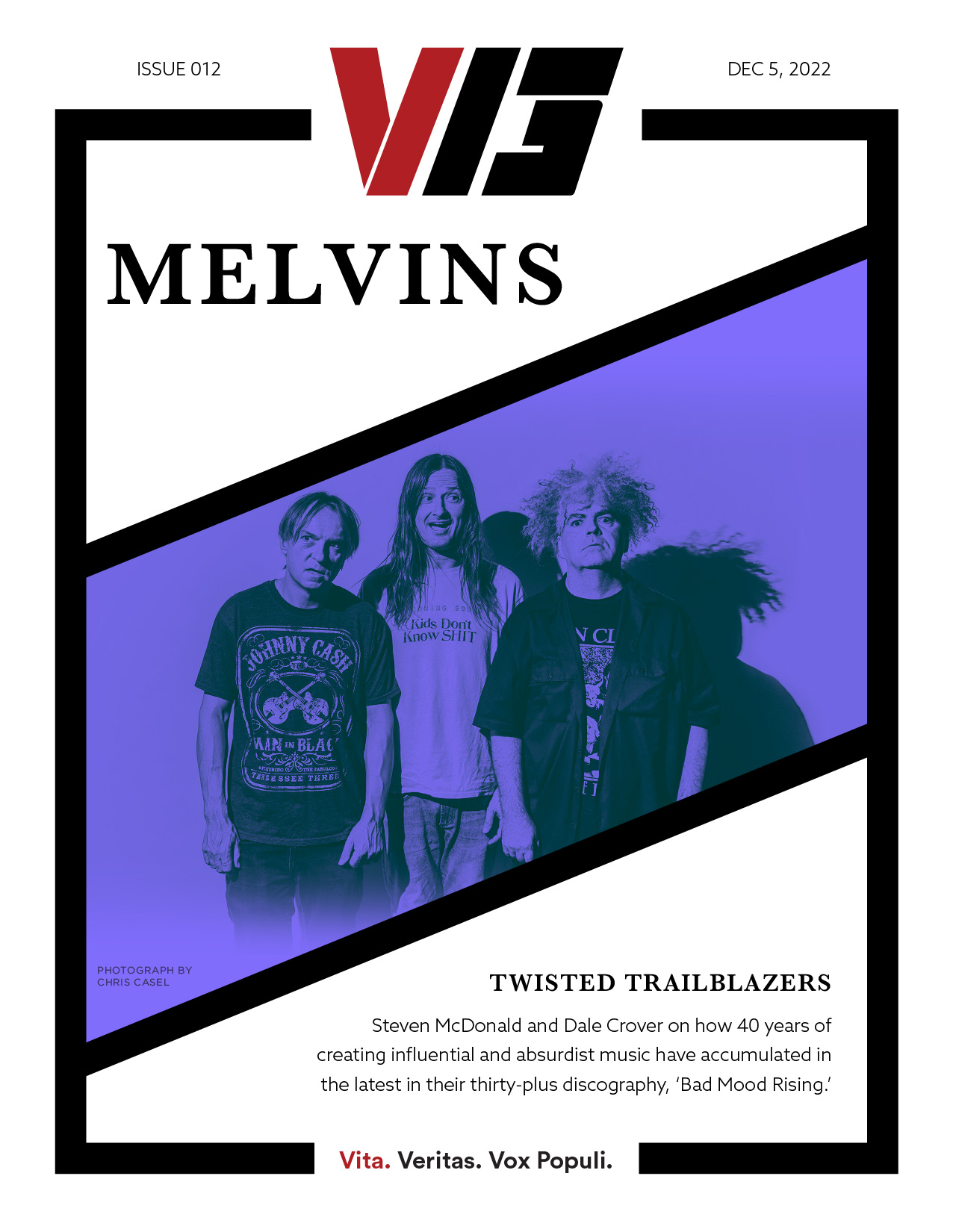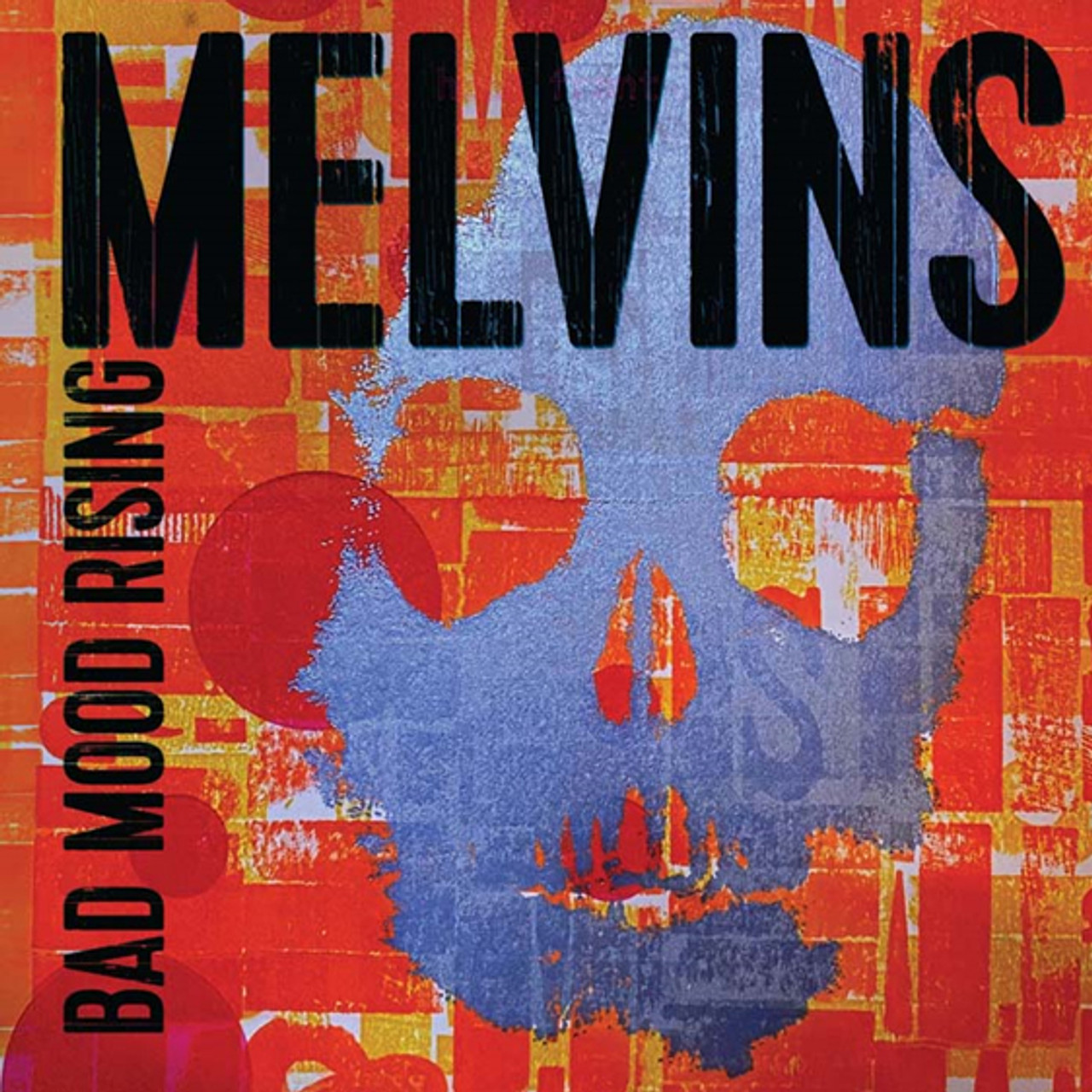

Alternative/Rock
Melvins: “We’ve burned every bridge and it’s either this or homelessness, so it’s this.”
Melvins members Steven McDonald and Dale Crover discuss how 40 years of creating influentially weird and absurdist music have accumulated in the latest in their thirty-plus discography, ‘Bad Mood Rising.’
For almost 40 years now, Melvins have trailed their own path, never concerned with the musical vogues at any given time during their existence and making whatever racket they felt like that week. Despite their potentially alienating heavy noise metal, they are trailblazers for the sludge metal, stoner rock, and grunge genres and are considered inspirations for multiple generations of music fans to follow.
Melvins bassist Steven McDonald and drummer Dale Crover spoke with Aaron Kavanagh to discuss their latest album Bad Mood Rising, playing music for four decades, lineup changes, Amphetamine Reptile Records, their expansive discography, record labels versus self-releasing, being considered inspirations to various mainstream arena rock bands, music formats and the revival of vinyl, songwriting, touring, and what they were having for breakfast.
Should you wish to listen to this podcast-style or play it while you read, our entire conversation can be streamed via SoundCloud.
Steven, I wanted to ask you; first, you’re the most recent member of the Melvins, you joined in 2015 if I’m correct, but the Melvins are not exactly a band with a quick turnaround rate [laughs]. I mean, I think the average member tends to be in the band for about a decade. When you committed to join the band, did you think that this could potentially be something you do forever? [Laughs]
Steven McDonald: “How long did you say the average band member stays in?”
Well, I didn’t actually do the math, but I think it was around a decade.
Steven: “A decade? Yeah, well, they never really like… We never really had, like, a relationship conversation. We never had the ‘Where is this going?’ (conversation). I was never really ‘popped the question,’ so to speak. So, I never really thought in those terms; I think both sides have always just been like, ‘Well, if it’s working, then let’s not question it, and if it stops working, then we’ll question it.” So, I sense that’s why I haven’t done too much futurizing about it. [Dale joins the Zoom call] Maybe Dale could weigh in on that question?”
Dale Crover: “Hello.”
Hi, Dale. How are you?
Dale: “Good. How are you?”
I was just asking Steven before you joined, I think the median length for an artist in the Melvins tends to be a decade…
Dale: “Yeah. So, the clock is ticking. [All laugh] The clock is ticking, right? He doesn’t know it, but he’s on double-secret probation; whatever that is.”
Steven: “I was telling him that, the funny truth of the matter, because he’s asking when I started it, how long did I imagine that I’d be doing it, and I said, ‘Well, technically, they never really popped the question.’ There was no relationship question. There was no relationship conversation, like, ‘Where is this going…?’”
Dale: “Right.”
Steven: “It’s more like if it feels good, you keep doing it, I guess.”
Dale: “He’s been playing with us for a long time now. And, not only that, but we play all over each other.”
Steven: “That’s true [Dale laughs].”
Well, for you Dale, as someone who has been with the band pretty much since its inception, almost four decades now; obviously you and (vocalist and guitarist) Buzz (Osborne) are sort of the main center of the band. You guys are sort of the foundation, I guess.
Dale: “Right.”

V13 Cover Story 012 – Melvins – Dec 5, 2022
When it comes to members changing, how do you adapt to that, considering that you and Buzzo have such a connection that’s rooted in decades of friendship and then someone new comes along and you kind of have to…?
Dale: “Start over. Yeah, we have to start over, basically – which we’ve done a bunch. I don’t know, Steven fit right in, right away. Our stuff isn’t super easy [laughs]. Some people, it takes longer to get, but also, we’re pretty open to how you interpret our songs, right? So, with Steven it was like, ‘Here’s how it goes; see what you can do.’ [Laughs] He always made it sound it great, too.”
Steven, for you, obviously the Melvins have been around for so long, they have such a vast discography. When you joined, was there perhaps parts of the discography that you weren’t familiar with, or had you kept up with it all until then?
Steven: “What was the question? Their vast discography, and then what did you ask?”
Yeah, so I was just wondering was their parts of their discography that you were unfamiliar with, or had you kept up with it all?
Steven: “Oh. Well, I mean, are you asking did I enter the band with a deep knowledge of any part of the discography?”
I was more so asking did you have any gaps in your knowledge of their music?
Steven: “Well, I mean, it’s so huge that, I mean, even their biggest fans aren’t familiar with certain parts. I mean, there’s how many albums, Dale? 30? [Laughs]”
Dale: “I don’t know [all laugh]. Yeah, there’s a shitload.”
Steven: Their drummer doesn’t know!”
Dale: “Yeah, there’s a shitload.”
Steven: “And he was on all of them!”
Dale: “And, no, I mean, you know, I think a lot of it was kind of new for him. I mean, obviously he’s familiar with the band, but, yeah, there’s a shitload of records. He had his work cut out for him when he joined the band, but he did a really great job.”
Steven: “Well, thank you, Dale. But, yeah, I think even superfans, people who spend a lot of money for Melvins memorabilia, etc., they even have gigantic holes in their Melvins knowledge. It’s quite a daunting task, their discography. But it’s been fun, it’s been a blast.”
Early on, like Dale said, I had my work cut out for me. I think in the first year, we did a lot of woodshedding and we did a deep-dive into a lot of different tunes; some of the more tricky tunes. But now it’s just kind of fun, it’ll be like I get to discover like, whatever, we did a song off (A) Senile Animal. This last tour was sort of a little bit of a discovery for me and I sang it and it felt like a new tune, I mean to me it did; I don’t want to piss any hardcore fans off, so it’s fun that way. There’s so much to dive into, there’s so much to discover. It keeps it fresh.”
Dale: “And he did a great job with that song, by the way. I’m so happy we’re playing it. It’s ‘A History of Bad Men,’ which we haven’t played…”
Steven: “[Mimes catching a fish with a rod] I was fishing for that [Dale laughs]. I hooked him [All laugh].”
Dale: “Well, we haven’t played that song since the Big Business guys have been in the band, because Jared (Warren; former Melvins and current Big Business bassist) sang it. So, we were like, ‘Steve! You get to play this song!’ [Laughs] You take the high part; I’ll take the low part,’ that’s the way we did it [All laugh].”
Well, speaking of your vast discography…
Dale: “Hey!”
Sorry?
Dale: “I was going to say, ‘Hey, what are you eating?’ What are you eating over there? [Steven holds up a bowl and a spoon]. You’re having cereal? [Holds up a mug] I’m having coffee.’”
Steven: “I’m having that too [Holds up a mug with writing on it]. This is my… what mug is this? It’s pretty fun, I think. [Turns the mug around and reads the writing on it] Oh, ‘This coffee is making me awesome!’ [All laugh] That was from Alfie to Anna, one Christmas.”
Dale: “Nice!”
Steven: “Sorry.”

Artwork for the album ‘Bad Mood Rising’ by Melvins
Yeah, sorry, I was just asking, so I think in your vast discography, there are certain albums that are more accessible than others and I think there are (others) that are a little more hard to approach.
What I found interesting about your new record, Bad Mood Rising¸ is that it starts off with this kind of Shamanic drumming and eerie sort of backtracked vocals and then it goes into a 14 minute instrumental that’s potentially off-putting for most people, but, when you get past that, it’s a very accessible hard rock record. I was wondering if that was an intentional decision; like a prank almost?
Dale: “To put a really long song first?”
Steven: “It’s like a gatekeeper. It’s like, ‘If you can get past this, there’s the promise of a sugary candy shop.’”
Dale: “Right.”
Well, it reminded me of, if you guys remember like when Black Flag were reinventing themselves, they did the Slip It In tour where they started off with a seven-minute instrumental called “The Process of Weeding Out,” then once the punkers left, Henry (Rollins; the Black Flag vocalist at the time) would come out, and they would play, like, “Nervous Breakdown” and “Six Pack” and all the songs the punks wanted to hear…
Steven: “Or it’s like Side Two of (the Black Flag album) My War in reverse.”
Right, exactly [Laughs].
Dale: “Yeah, I mean, which all that stuff we’re definitely into. Yeah, I don’t know, we just thought it was a good idea to have a 14-minute-long song start off the record, really. Which is probably the longest song we’ve ever written. But, you know, the Lysol record is similar, but, you know, with that, that was right at the height of CDs. So, we made it just one track so you wouldn’t have to skip that long song, because we really wanted people to hear that song, because we thought it was good. So, with ‘Mr. Dog is Totally Right,’ it’s a great song.”
With Bad Mood Rising, you guys have been with Amphetamine Reptile for the last decade, releasing EPs, but this is the first LP you guys have put out with them since Honky in ’97. I was wondering, was there any kind of expectations, going back to that label with your first LP or do you just kind of wing it and go, “Yeah, we’re just going to make what we make?”
Dale: “Pretty much. You know, he (Tom Hazelmyer; the label’s founder and owner) hasn’t really put out, besides weirdo stuff that we do and limited-edition stuff, he hasn’t done a regular release like this for a long time, besides, maybe, there’s a band that he just put a record out by, called Mr. Phylzzz. But, mostly the label has been more-or-less defunct [laughs], you know? I don’t know, yeah, we just decided we wanted to do a full-length for them and keep it simple and stupid. So, that’s it.”
Obviously, you guys have bounced around a lot from various indie and major labels. I was wondering, has the thought of self-releasing ever been a thought of serious consideration for the Melvins?
Dale: “Yeah, kind of. I mean, even before we hooked up with Ipecac, we were thinking of starting our own thing, but since they were, that’s why we went with those guys. Yeah, I don’t know. Yeah? Yes? It’s a lot of work, though. So, I don’t know. It’s a lot to take on. But, maybe. Working with Tom is pretty close to that.”
Steven: “Yeah. I mean, you can say like, ‘What’s the difference?’ I mean, Ipecac, kind of too, I mean…”
Dale: “Yeah.”
Steven: “The big difference would be, like, whether or not you guys wanted to sign bands and put other people’s records out…”
Dale: “No [all laugh]. We wouldn’t want to do that [laughs].”
Steven: “That’s not something you’re interested in doing, so…”
Dale: “I mean, it’s a lot of work. I mean, we kind of do: Buzz and Mackie (Osborne; artist, musician and Buzz’s wife) make all that homemade stuff at their house.”
Steven: “Yeah.”
Dale: “And we sell that on the road. And, more-or-less, that is making our own stuff, you know? Making our own records or whatever.”
Steven: “And, in terms of the band supporting younger, newer or whatever, just younger artists, they take bands on the road, or we take bands on the road, and…”
Dale: “Yeah.”
Steven: “…put a big spotlight on them. So, you know, in terms of helping to, you know, stimulate young artists or new artists, Melvins do their part; they don’t also have to stuff their records, I don’t think, necessarily, and beg for distribution for them.”
Dale: “No, but definitely, those guys making all that homemade stuff, it’s a lot of work, for sure.”
Steven: “Yeah!”
Dale: “It is stuffing our own records, you know!”
Steven: “But it’s for our records; it’s for ours, you know? But, you know, do you want to do that for…?”
Dale: “Right, right. No.”
Steven: “…some teenager?”
Dale: “Right [laughs].”
The new album (had a surprise release); there wasn’t much lead-up, there wasn’t much promotion prior to it. I was wondering, do you think that’s sort of an advantage, I guess? Now, when you can you put out a record, people who want to find it can find it. It doesn’t have to be – months prior to the release – doing a bunch of advertising, doing a bunch of promo?
Dale: “Yeah. Well, I mean, one of the reasons why it, kind of, didn’t really have an advance was because we were waiting on the vinyl. We didn’t know when it was going to show up and we didn’t want to make a big to-do out of it and not have it. And then, all of a sudden, it just showed up and it showed up early [laughs]. So, it was just like, ‘Oh, shit! Ok, let’s go!’ And, I mean, we were already… I think that, maybe for the first couple of weeks, we didn’t have any on tour yet. Is that right, Steve? I can’t really remember.”
Steven: “Yeah, Buzz and Gareth (Turner; the band’s merchandise manager) went back to LA.”
Dale: “That’s right.”
Steven: “From, like, Bakersfield or wherever.”
Dale: “Right, because the vinyl was in transit.”
Steven: “The California section of our last tour didn’t get a chance to buy the record.”
Dale: “Right.”
Steven: I mean, you could say there wasn’t much build-up, but you could also say, well, we did 108 shows in 2022, so I don’t know… [All laugh]”
Dale: Right.”
Steven: “I guess we were promoting another; our triple-boxset acoustic album during that time [laughs].”
Dale: “That, but also there was the EP that had ‘Never Say You’re Sorry’ on it, so that was kind of like a preview.”
Steven: “Oh, ok. So, that was, yeah, that was a preview.”
Dale: “Yeah. Right. It just, it was out way before we had the vinyl. So, the pandemic. We blame the pandemic.”
Steven: “You could also say, maybe Amphetamine Reptile has their own sort of trademark, mysterious marketing techniques?”
Dale: “Right. We don’t need any promo; we just drop it. We just dropped the record. [Imitates the sound of something heavy crashing down] ‘There it is! Go get it! Go and get it!’”
Steven: “It’s like a teenager and a hot mixtape. Just dropped it.”
Dale: “Um-hum. Yup.”
“It’s weird for the Melvins to get compared to… I mean, it makes sense – Nirvana – I mean, Dale played in Nirvana!”
What I found interesting there in what you were saying is that obviously you guys have so many releases going at one time that I guess what you’re touring at any given time gets kind of muddled? Would that be fair?
Dale: “Well, there’s a lot, definitely. But, I mean, we made this record over a year ago, you know? Oh, and kind of back to what you were saying about it being accessible, yeah. Yeah. Maybe. I think it’s got some hooks.”
I think the Melvins have always had hooks. I think even with some of your most experimental music, there was always that thing to grab onto.
Dale: “Right.”
I think you guys obviously have such vast musical influences, from hard rock and punk and classic rock and kind of all over the place. I imagine those sorts of things are very important when incorporating music. I know Buzz is the primary songwriter for the band. I imagine for him that’s an important thing to have?
Dale: “Oh, yeah. Yes.”
[Laughs] So, it’s not just droning; it’s not no-wave or anything like that. Was that always something that you consciously didn’t want to verge into or was that just something that just kind of happened? When writing songs, would you guys be able to, I don’t know, sort of be able to go past the need to add in a catchy hook or a lick or something like that?
Dale: “Yeah, I don’t know [both laugh]. Yeah, you’re right; the main songwriter isn’t here to tell you that [laughs].”
[Laughs] Yeah, OK.
Steven: “I mean, I would guess that the main… [Dale goes to speak] I’m sorry. Go ahead, Dale; I didn’t mean to interrupt.”
Dale: “Well, I mean, Steve and Buzz were the ones who kind of went out and went to the desert and came back with these songs, so…”
Steven: “Kind of. I think Buzz had some songs in his pocket when he headed towards the desert.”
Dale: “Well, I don’t know! I wasn’t there! You guys went out on this spiritual journey, out into the desert, right?”
Steven: “[Laughing] True, we did.”
Dale: “To write this record.”
Steven: “I massaged a few tunes out of him and put them into my laptop, and we called them ‘Demos’ [Dale laughs]. But the thing is, you know, I think that… I would guess that Buzz would… I don’t think that he would be comfortable with this idea that there’s anything that he couldn’t approach, that he couldn’t do. If he wanted to do something really sugary and bubblegum, he takes a lot of pleasure in surprising people that he not only likes that and wants to do that, he can do that.”
Dale: “Right.”
Steven: “So, I think what would be more surprising is if you weren’t surprised.”
Yeah. Well, given that kind of attitude of “We just do whatever the fuck we want,” has it been surprising to you guys to see your own popularity and how internationally known you are?
Basically, I don’t think there’s anywhere in the world that you guys can’t tour. Not only that, but you guys are often cited as an inspiration for major arena acts, like Nirvana, Soundgarden, Tool, Faith No More, Queens of the Stone Age, and so on. Does that kind of surprise you?
Dale: “Oh, it’s great. Surprising? Sure [laughs]. But, I mean, we’re also really happy that… yeah, it’s great. We’re able to make a living doing this after almost 40 years, so. We’re also really happy that we survived the pandemic, and not everything went to shit; there are still places for us to play [laughs].”
Steven: “Yeah. Some places got an upgrade even, dare I say.”
Dale: “Yeah! I know!”
Steven: “You know, people often sometimes… it’s weird for the Melvins to get compared to… I mean, it makes sense – Nirvana – I mean, Dale played in Nirvana! But, you know, also they came from such a small, remote place. It’s crazy that not only one band came from there, but two bands that are worldly known; worldwide.
But, in all reality, how many musicians ever make any money, much less a living, playing music? It’s like an infinitesimal amount of people that pick up a guitar that achieve this. So, it’s weird that Melvins… I think it’s kind of a little bit unfair that Melvins often get compared to this tiny, tiny molecule of community that has managed to strike gold or whatever and have mainstream success; that’s a true oddity. And why should the Melvins be compared, as if that’s a standard, you know? [Laughs]
It’s like, ‘How do you feel about that?’ It’s all relative. But I think what the Melvins do well, gracefully, is they never lose perspective of their place in all of it, and I see them as very graciously and gracefully navigating often absurd waters, and they don’t… they’re never really full of themselves in the middle of all of it, when there are many times they could be. And they always seem to be grateful, and they keep their head down and they do their work and they’re happy about it, so, you know. I’m sorry, I’ve kind of gone on a tirade.”
No, no; not at all!
Steven: “I hope it applies to what you’re… the question you were kind of asking.”
For both of you guys, you’ve been touring and playing music now for 40 years, obviously, not in the Melvins for 40 years, in the case of Steve, but both of you have been playing for 40 years or more. I was wondering what keeps doing it for you? What inspires you guys to go out and perform every night or to write new music and to play?
Dale: “Well, we have nothing to fall back on [all laugh]. We’ve burned every bridge and it’s either this or homelessness [all laugh]. So, it’s this. I mean, seriously, I’ve been doing this since I was 16, you know? The last job I had was in 1989, maybe ’90, in a pizza place, so I got… [laughs]. What the hell am I going to do, you know?”
You guys have been around kind of through all the differences in music technology, from vinyl, to tape, to CD, to digital, and back to vinyl. I was wondering has the format of the time influenced how you write? Because you (Dale) were mentioning earlier that CD allowed you guys to make larger… you could fit more music onto a CD than a vinyl record, for example.
Dale: “Right.”
Now that we’re kind of back in vinyl territory, is that familiar to you guys?
Dale: “Yeah, it’s kind of weird, because when we first started making records, we had to think about 35 minutes time. Well, it’s always been about time, but I remember we looked at all these different records to see how long records were, because we didn’t really know, and we’re looking at The Beatles, you know? From Beatles to Stooges records, and they’re all like about 35 minutes long.
And also, you had to think about Side One and Side Two. And then, all of a sudden, CDs were popular, and we thought about more of one long thing. And people made some really long CDs at the time, you know? Like, ‘Oh, you can get 75 minutes on here! So, we’ll put that much on it,’ you know? Actually, our first CD that we released had our first record on it, because we could fit it on there [laughs].”
Steven: “One thing that I’ve always agreed with Melvins, and I think it’s kind of an unpopular opinion, is that CDs are great [all laugh].”
Dale: “Yeah!”
Steven: “I mean, not that I have a lot of CD players around the house anymore, because they do, like all things, go to pot.”
Dale: “Right.”
Steven: “But I love the digital format. You know, like, I grew up with vinyl and I loved my vinyl records, they got me through a lot of tough times in my life, but I also hated the crackling and the pops, and I remember every crackle, I mean…”
Dale: “Right!”
Steven: “…I listened to these records (so much) that I expect to hear a particular snip.”
Dale: “Right, it’s like when you heard Led Zeppelin II for the first time without it going [imitates the scratching sound of a needle jumping on the groove] and you’re just like, ‘Whoa! That’s what it’s supposed to sound like!’”
Steven: “Yeah! [Laughs]”
Dale: “How I was convinced that it sounded better, well, our first record, I remember hearing it on vinyl and, as I said, we put our first record onto our second record CD, and when I heard it on CD, I was like, ‘Oh! That sounds like it did when I was in the studio, listening to it live,’ you know? People will argue all day long about that, but, I mean, you know…”
Steven: “[Laughs] I agree. I love the ritual of, you know… I understand turning the record over and paying closer attention and, actually in 12th grade, when I was 17 or 16, I can’t remember, for my consumer economics class, I did my paper on vinyl and that I thought that it was important, as opposed to the new format, CD. This is 1985 [Dale laughs]. And I said because of the packaging.”
Dale: “Yeah.”
Steven: “I basically, in a very, like, you know, not articulate way, said the experience will remain valuable. I didn’t necessarily know to a very small niche, but I knew that it would remain valuable, and it’s true. So, I get that part of it and that’s a big part of the Melvins fanbase, too. But, as far as the musicians’ (intent) and what we prefer to listen to ourselves, I got no problems with the digital formats; I think they’re great.”
Dale: “Right. Well, I can show you my two broken turntables in here and I don’t have a CD player, but I’ve got probably a thousand CDs. But I did just spend 200 dollars on this boxset, this vinyl boxset. [He holds up a copy of The Beatles’ Revolver album. The cover begins fading into his Zoom background, which is the cover to the latest Melvins record, Bad Mood Rising.]”
Steven: “Oh, we can’t see it! It went away!”
Dale: “Oh, you can’t see it?”
Yeah. Revolver.
Dale: “Can you see it now? [He brings the album closer to the camera.]”
Yeah, the new Revolver re-release?
Dale: “You just see the Melvins record, right?”
Steven: “Does it [the Revolver cover] have moving eyeballs?”
Dale: “No.”
Steven: “The eyeballs don’t move?! Awwhhhh!”
Dale: “They don’t, but you know what? If I really want to listen to it, I can put it on my phone and I can watch the moving eyeballs on iTunes [all laugh]. Which is how I’ve listened to it, but at some point, once I fix those two broken turntables, I’m going to listen to the mono version of this record.”
Steven: “Oh, wow! Awesome.”
Dale: “Because I can. Or, because I will be able to. Well, there is one working turntable in the house and it’s a Crosley, so that’s probably how it would have sounded had I bought that record in 19…when did that come out?”
Steven: “1966, I think. So, is that a close-and-play? Is that a tiny little, one speaker; the Crosley?”
Dale: “Yeah, yeah, yeah, yeah. It’s one of those…yeah. It’s the only working turntable in the house [all laugh].”
Steven: “Awesome.”
Dale: “[Continuously laughing] In fact, I listened to the masters of something that’s coming up on the turntable [all laugh] just to make sure that everything was good! And you know what? Sounded awesome! If it sounds good on that, then it’s all fine, right? So, there you go!”
Well, thanks for your time; it was very nice meeting you guys. Is there anything you guys want to add before we wrap up?
Dale: “Buy our new record because it’s really great and cool.”
Steven: “Oh, yeah. Get it!”
Dale: “It looks just like this! [He points to the cover art in his background] You guys see that?”
Steven: “And we dare you to get past the first song!”
Dale: “Oh, the first song’s awesome. We were playing that live before the record came out and you could tell people were kind of looking around, wondering, but, you know, by the time…”
Steven: “No one left.”
Dale: “No.”
Steven: “There wasn’t a mass exodus.”
Dale: “Right. Well, once we get to the repeated part of the doomy riff, then everybody, like you were doing earlier, [Replicates Steven’s earlier miming of catching a fish with a rod] reeling them in, you know? [All laugh]”
Steven: “What’s funny is that we actually did, on the last tour, we did two songs off the record, we played both songs on Side A [All laugh].”
Dale: “Right.”
Steven: “So, you kind of have half the album.”
Dale: “Well, it is half the album!”
Steven: “Yeah, it is half the album.”
Dale: “Because we go by time.”
Steven: “What’s that?”
Dale: “We go by time.”
Steven: “We go by time.”
Dale: “It’s all about time.”
Steven: “But if you go buy the album, it’s Side A. Instead of, like, we did Side Two of My War or ‘The Process of Weeding Out.’ We didn’t start the set with it; we put it in the middle. But, it kind of also reminded me of, um, I mean, it’s not just a punk rock thing; I saw The Who recently and they did two mini-versions of a suite of songs from Quadrophenia and a suite of songs from, eh…movements. They did several movements from Tommy.”
Dale: “Nice!”
Steven: “There was a similar kind of thing, you know? In the middle of the set, we went into this other kind of piece that stands on its own and it’s kind of an old tradition, you know?”
Dale: “Cool.”
Yeah, it kind of reminded me, this is an odd comparison, perhaps, but of Krautrock [Laughs]
Steven: “Krautrock? Is that what you said?”
Yeah [Laughs]. Kind of that tradition.
Steven: “Sure! It’s like a Can suite, a Can movement?”
Yeah, “Yoo Doo Right” [Laughs].
Dale: “Yeah, we’ve heard a Can or an Amon Düül record or two before [laughs]!”
Steven: “Yeah.”
Dale: “Yeah, so we know our way around a Krautrock.”
Thanks very much, guys. Appreciate it.
Dale: “Alright, thanks.”
Steven: “Thank you.”
Dale: “Take care.”
-

 Alternative/Rock6 days ago
Alternative/Rock6 days agoThe Warning Shake the Foundations of a Sold-Out Leeds Stylus [Photos]
-

 Music2 weeks ago
Music2 weeks agoTake That (w/ Olly Murs) Kick Off Four-Night Leeds Stint with Hit-Laden Spectacular [Photos]
-

 Alternative/Rock6 days ago
Alternative/Rock6 days agoThe V13 Fix #011 w/ Microwave, Full Of Hell, Cold Years and more
-

 Alternative/Rock2 weeks ago
Alternative/Rock2 weeks agoThe V13 Fix #010 w/ High on Fire, NOFX, My Dying Bride and more
-

 Features2 weeks ago
Features2 weeks agoTour Diary: Gen & The Degenerates Party Their Way Across America
-

 Indie6 days ago
Indie6 days agoDeadset Premiere Music Video for Addiction-Inspired “Heavy Eyes” Single
-

 Folk6 days ago
Folk6 days agoKatherine Perkins Strikes the Right Tone with Her “Hold On” Music Video Premiere
-

 Country1 week ago
Country1 week agoBrooke Ashton Chats About Her “Someone” Single, Creative Process, and More!













